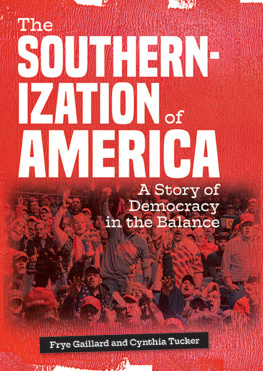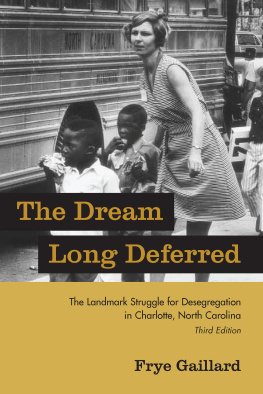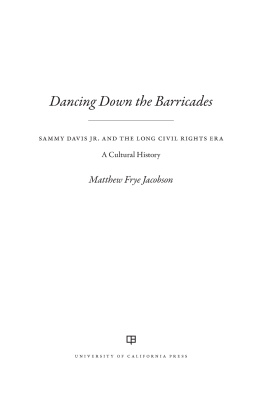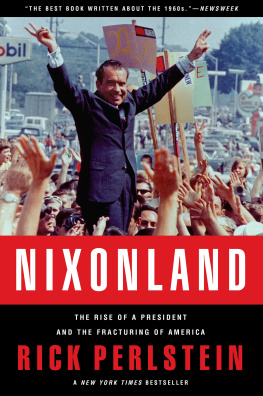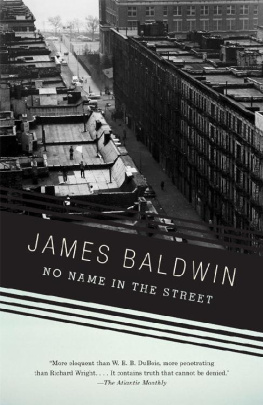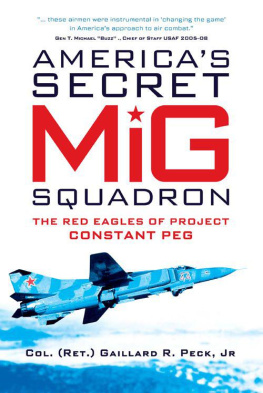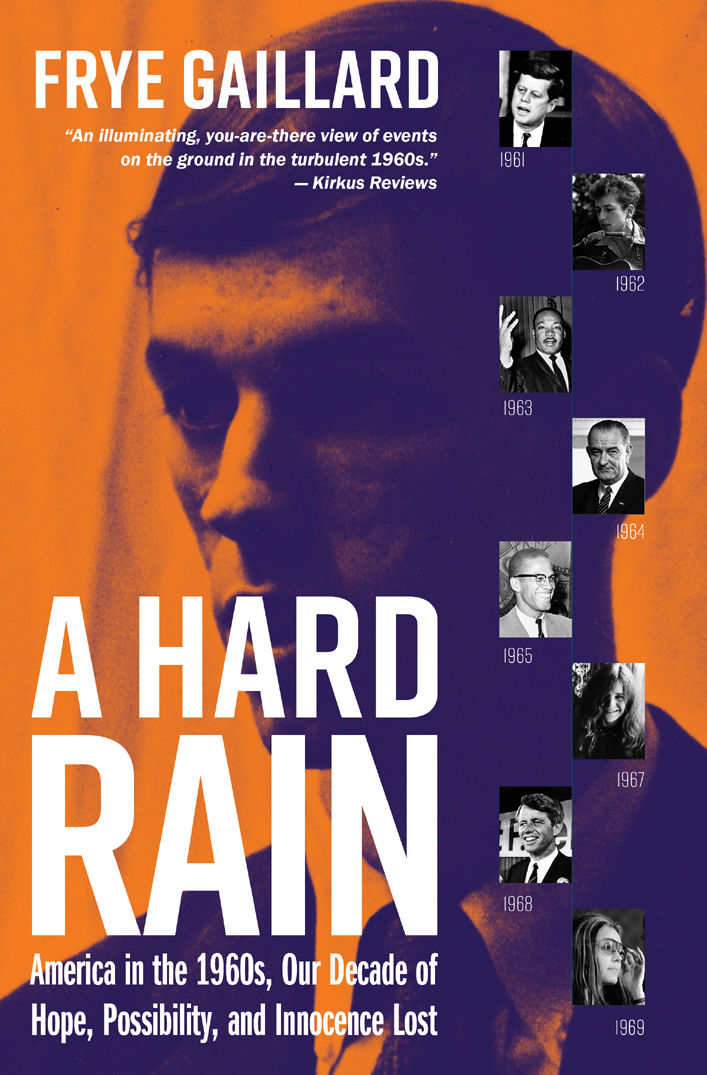
ALSO BY FRYE GAILLARD

NONFICTION
Watermelon Wine (1978)
Race, Rock & Religion (1982)
The Catawba River (1983)
The Dream Long Deferred (1988)
Southern Voices: Profiles and Other Stories (1991)
Kyle at 200 M.P.H. (1993)
Lessons from the Big House (1994)
The Way We See It (WITH RACHEL GAILLARD, 1995)
If I Were a Carpenter (1996)
The Heart of Dixie: Southern Rebels, Renegades and Heroes (1996)
Voices from the Attic (1997)
Mobile and the Eastern Shore (WITH NANCY AND TRACY GAILLARD, 1997)
As Long As the Waters Flow (WITH PHOTOS BY CAROLYN DEMERITT, 1998)
The 521 All-Stars (WITH PHOTOS BY BYRON BALDWIN, 1999)
The Greensboro Four: Civil Rights Pioneers (2001)
Cradle of Freedom (2004)
Prophet from Plains: Jimmy Carter and His Legacy (2007)
In the Path of the Storms (WITH SHEILA HAGLER, PEGGY DENNISTON, 2008)
With Music and Justice for All (2008)
Alabamas Civil Rights Trail (2010)
The Books That Mattered (2013)
Journey to the Wilderness (2015)
FICTION
The Secret Diary of Mikhail Gorbachev (1990)
CHILDRENS
Spacechimp: NASAs Ape in Space (WITH MELINDA FARBMAN, 2000)
Go South to Freedom (2016)

NewSouth Books
105 S. Court Street
Montgomery, AL 36104
Copyright 2018 by Frye Gaillard
All rights reserved under International and Pan-American Copyright Conventions. Published in the United States by NewSouth Books, a division of NewSouth, Inc., Montgomery, Alabama.
Library of Congress Cataloging-in-Publication Data
Names: Gaillard, Frye, 1946- author.
Title: A hard rain : America in the 1960s, our decade of hope, possibility, and innocence lost / by Frye Gaillard.
Other titles: America in the 1960s, our decade of hope, possibility, and innocence lost
Description: Montgomery, AL : NewSouth Books, [2018]
Identifiers: LCCN 2018003191| ISBN 9781588383440 (trade cloth : alk. paper) | ISBN 9781603064545 (ebook)
Subjects: LCSH: United States--History--1961-1969. | Social change--United States--History--20th century. | Popular culture--United States--20th century. | United States--Politics and government--1945-1989. | United States--Social conditions--1945- | Civil rights movements--United States--History--20th century. | Race relations--United States--History--20th century. | National characteristics, American--History--20th century. | Nineteen sixties.
Classification: LCC E839 .G35 2018 | DDC 973.9--dc23
LC record available at https://lccn.loc.gov/2018003191
Edited and designed by Randall Williams
Printed in the United States of America by Sheridan
For Nancy with love .. .
for sharing this journey and all the others
And in memory of Tom Peacock
I heard the sound of a thunder that roared out a warning
Its a hard rains a-gonna fall
BOB DYLAN
The arc of the moral universe is long
but it bends toward justice
MARTIN LUTHER KING, JR.
In our sleep, pain which cannot forget
falls drop by drop upon the heart
until in our own despair, against our will
comes wisdom through the awful grace of God
AESCHYLUS (AS QUOTED BY ROBERT KENNEDY)
Contents
Table of Contents
Guide
EDITORS NOTE: A Hard Rain is a recollection of the 1960s, and as such it features many iconic songs from that era. To complement the reading experience, the author and NewSouth Books staffers have built a Spotify playlist that includes songs from Bob Dylan, The Beatles, Elvis Presley, Joan Baez, Sam Cooke, and many more.
To access the playlist, search A Hard Rain Reader Soundtrack on Spotify or scan the code below by tapping the camera icon next to the search bar in the app (available on iOS, Android, and PC).

There are many different ways to remember the 1960s, and this is mine. I have used interviews, journalistic accounts, and the work of other scholars and memoirists to add flesh to the bones of personal recollection. I have set out to capture in these pagesfor those who lived it and wish to remember, and for those who didnt but still want to knowthe competing story arcs of tragedy and hope. There was in these years the sense of a steady unfolding of time, as if history were on a forced march, and the changes spread to every corner of our lives. As future generations debate the meaning (I also seek to do some of that here), I hope to offer a sense of how it felt. For me this is history of a personal kind, the story of a decade in which I came of age, and in which my professional aspirations took shape. I graduated from college in the terrible year of 1968, a year in which two assassinations altered the psyche and spirit of the country in ways from which we have not yet recovered. I knew as a journalist beginning my career in that year that I wanted to write about these things, and that the line between history and journalism was thin. In many ways, I think, everything I have written is rooted in that time.
Thus I offer within these pages one writers reconstruction and remembrance of a transcendent eraone that, for better or worse, lives with us still.
AS OUR THOUGHTS RETURN to those turbulent times, which they do so often, many of us remember in fragmentsin bits and pieces of cherished recollection in which the world seems brimming over with hope. There is the face of JFK, confident and smiling, frozen in memory on the television screen, delivering the words now chiseled on his grave:
Now the trumpet summons us againnot as a call to bear arms, though arms we need, not as a call to battle, though embattled we arebut a call to bear the burden of a long twilight struggle, year in and year out, rejoicing in hope, patient in tribulationa struggle against the common enemies of man: tyranny, poverty, disease and war itself.
And there is the image, too, of Dr. Martin Luther King Jr. speaking on a temperate summer afternoon, a crowd of 250,000 stretching out before him as far as the eye could see. He has not strayed far from the words on his written draft when Mahalia Jackson, standing nearby, urges him gently: Tell them about the dream, Martin. And we remember how his words then took flight, how the poetry and the cadence blended, as he left his printed text behind.
I say to you today, my friends, even though we face the difficulties of today and tomorrow, I still have a dream. It is a dream deeply rooted in the American dream. I have a dream that one day this nation will rise up and live out the true meaning of its creedwe hold these truths to be self-evident, that all men are created equal.
THOSE WERE DEFINING MOMENTS of a decade, the 1960s, when we seemed on the brink of a different kind of greatness, rooted not only in our national might, but in our capacity for introspection. In America, there were men stepping forward to lead usand women too, whose passionate voices grew stronger with timeand they seemed to be unafraid of our flaws. For most of our troubled history as a nation, we had seemed not to mean some of what the Founding Fathers had said. Certainly, it was clear that not all men were created equal, nor women either, but now as the Sixties came into focus, we were swept along, many of us, by the frightening power of a patriotic notion. Maybe we could, as Dr. King said, live out the true meaning of our creed.


